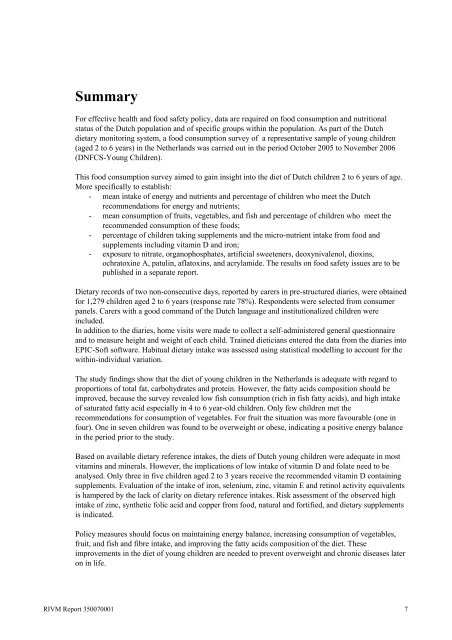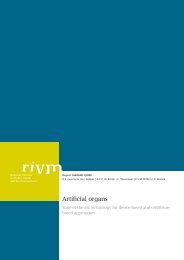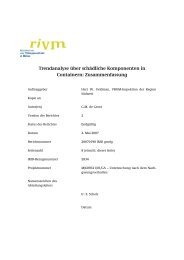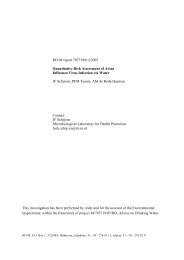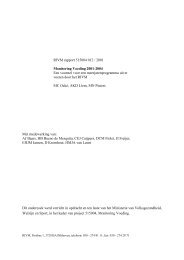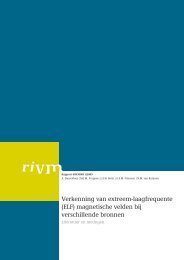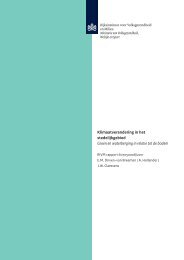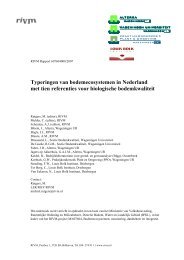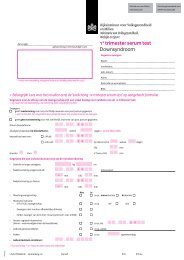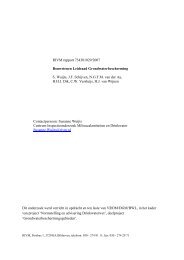RIVM rapport 350070001 Dutch National Food Consumption Survey ...
RIVM rapport 350070001 Dutch National Food Consumption Survey ...
RIVM rapport 350070001 Dutch National Food Consumption Survey ...
You also want an ePaper? Increase the reach of your titles
YUMPU automatically turns print PDFs into web optimized ePapers that Google loves.
Summary<br />
For effective health and food safety policy, data are required on food consumption and nutritional<br />
status of the <strong>Dutch</strong> population and of specific groups within the population. As part of the <strong>Dutch</strong><br />
dietary monitoring system, a food consumption survey of a representative sample of young children<br />
(aged 2 to 6 years) in the Netherlands was carried out in the period October 2005 to November 2006<br />
(DNFCS-Young Children).<br />
This food consumption survey aimed to gain insight into the diet of <strong>Dutch</strong> children 2 to 6 years of age.<br />
More specifically to establish:<br />
- mean intake of energy and nutrients and percentage of children who meet the <strong>Dutch</strong><br />
recommendations for energy and nutrients;<br />
- mean consumption of fruits, vegetables, and fish and percentage of children who meet the<br />
recommended consumption of these foods;<br />
- percentage of children taking supplements and the micro-nutrient intake from food and<br />
supplements including vitamin D and iron;<br />
- exposure to nitrate, organophosphates, artificial sweeteners, deoxynivalenol, dioxins,<br />
ochratoxine A, patulin, aflatoxins, and acrylamide. The results on food safety issues are to be<br />
published in a separate report.<br />
Dietary records of two non-consecutive days, reported by carers in pre-structured diaries, were obtained<br />
for 1,279 children aged 2 to 6 years (response rate 78%). Respondents were selected from consumer<br />
panels. Carers with a good command of the <strong>Dutch</strong> language and institutionalized children were<br />
included.<br />
In addition to the diaries, home visits were made to collect a self-administered general questionnaire<br />
and to measure height and weight of each child. Trained dieticians entered the data from the diaries into<br />
EPIC-Soft software. Habitual dietary intake was assessed using statistical modelling to account for the<br />
within-individual variation.<br />
The study findings show that the diet of young children in the Netherlands is adequate with regard to<br />
proportions of total fat, carbohydrates and protein. However, the fatty acids composition should be<br />
improved, because the survey revealed low fish consumption (rich in fish fatty acids), and high intake<br />
of saturated fatty acid especially in 4 to 6 year-old children. Only few children met the<br />
recommendations for consumption of vegetables. For fruit the situation was more favourable (one in<br />
four). One in seven children was found to be overweight or obese, indicating a positive energy balance<br />
in the period prior to the study.<br />
Based on available dietary reference intakes, the diets of <strong>Dutch</strong> young children were adequate in most<br />
vitamins and minerals. However, the implications of low intake of vitamin D and folate need to be<br />
analysed. Only three in five children aged 2 to 3 years receive the recommended vitamin D containing<br />
supplements. Evaluation of the intake of iron, selenium, zinc, vitamin E and retinol activity equivalents<br />
is hampered by the lack of clarity on dietary reference intakes. Risk assessment of the observed high<br />
intake of zinc, synthetic folic acid and copper from food, natural and fortified, and dietary supplements<br />
is indicated.<br />
Policy measures should focus on maintaining energy balance, increasing consumption of vegetables,<br />
fruit, and fish and fibre intake, and improving the fatty acids composition of the diet. These<br />
improvements in the diet of young children are needed to prevent overweight and chronic diseases later<br />
on in life.<br />
<strong>RIVM</strong> Report <strong>350070001</strong> 7


